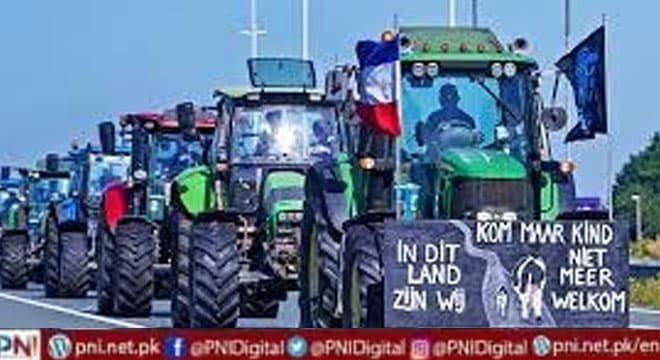Barneveld, Netherlands, Aug 3 (AFP/APP): Dutch farmers’ rowdy protests against government climate plans have caused a stir at home and abroad, with populists worldwide jumping on the bandwagon and even former US president Donald Trump backing them.
“We take all the support that we can get,” says Jaap Kok, a 62-year-old cattle farmer standing in a meadow full of cows near Barneveld in the central Netherlands’ farming belt.
The farmers have wreaked havoc for weeks, dumping manure and garbage on highways, blockading supermarket warehouses with tractors and rallying noisily outside politicians’ houses.
They oppose plans to cut emissions of nitrogen in the Netherlands — the world’s second-biggest agricultural exporter after the United States — by reducing livestock and closing some farms.
While a small group has been blamed for much of the unrest, there have also been large protests involving thousands of tractors.
With the protests garnering global headlines, right-wing figures have been quick to voice support. As well as Trump, they include French far-right leader Marine Le Pen, and Dutch far-right politicians Geert Wilders and Thierry Baudet.
“I would have preferred that the support came from the left but from the right is fine too,” said Kok, whose own farm risks closure.
The tiny Netherlands produces huge amounts of food thanks to industrialised farming — but at the cost of being one of Europe’s largest greenhouse gas emitters.
That is especially true of nitrogen, with much of this blamed on ammonia-based fertiliser and cattle-produced manure. Agriculture is responsible for 16 percent of all Dutch emissions.
Nitrogenous gases play an important role in global climate change. Nitrous oxide is a particularly potent greenhouse gas as it is over 300 times more effective at trapping heat in the atmosphere than carbon dioxide.
The Netherlands’ flat landscape sitting just above sea level makes it vulnerable to extreme weather.
In July the Netherlands recorded its third-highest temperature since records began — 39.4C in the southern city of Maastricht.
Nitrogen-containing substances are also blamed for damage to plant and animal habitats.
Following a 2019 court ruling that the Netherlands was not doing enough to protect its natural areas from nitrogen pollution, the Dutch government said in June that the only way to meet climate goals by 2030 was “radical” cuts to farming.
This would involve a reduction in particular of around 30 percent to the Netherlands’ herd of some four million cows.
The government has offered some 25 billion euros to help farmers adapt — but has also warned that some closures are possible.
“The farmers are very angry,” said Jos Ubels, vice president of the Farmers Defence Force (FDF), one of the groups coordinating the demonstrations.
“In history, every time there is a problem with a minority they have to shout really hard to be heard, so this is what we are doing.”
Ubels said his group was not responsible for the roadblocks, saying that it was “just organised by local farmers — they are very angry because they are played with.”
Prime Minister Mark Rutte recently called the protests “life-threatening”, yet there is a groundswell of support.
Follow the PNI Facebook page for the latest news and updates.









